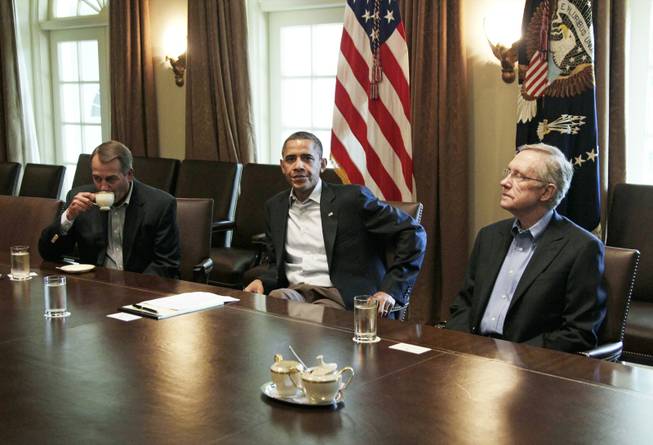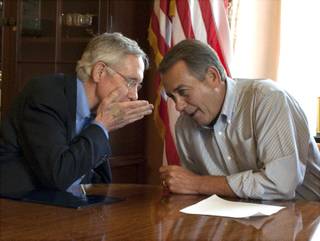
Carolyn Kaster / AP
President Barack Obama meets with Senate Majority Leader Harry Reid, right, and House Speaker John Boehner of Ohio, left, in the Cabinet Room of the White House, Saturday, July 23, 2011, in Washington, to discuss the debt.
Published Saturday, July 23, 2011 | 7:38 p.m.
Updated Saturday, July 23, 2011 | 9:10 p.m.
Sun archives
- Debt crisis: Deal sought in Washington to head off stock plunge (7-23-2011)
- Lots of private talks, but still no deal, on debt ceiling (7-21-2011)
- Boehner: House will compromise on debt limit (7-21-2011)
- Reid sends signal he won’t back compromise bill based on budget cuts (7-21-2011)
- With debt ceiling decisions will come consequences — practical and political (7-15-2011)
- Dean Heller takes hard line on debt ceiling, wants balanced budget amendment (7-15-2011)
- Latest developments in debt ceiling standoff (7-14-2011)
- Debt ceiling debate colors Nevada 2012 elections (7-8-2011)
- Harry Reid to keep Senate in session as debt limit deadline looms (6-30-2011)
- Berkley says no to raising debt ceiling, refuses ‘show vote’ (5-31-2011)
- Measure on raising debt ceiling not likely to gain traction (5-31-2011)
The quartet of congressional leaders who huddled with President Barack Obama to talk debt frameworks Saturday morning hunkered down to hash out details of a deal Saturday evening and apparently achieved...nothing.
Talks appeared to be homing in on a two-step plan to bring the country back from the brink of default.
According to various reports, in the first stage, some lawmakers were proposing raising the debt limit by about $1 trillion to $2 trillion to be offset by discretionary spending cuts. In the second stage, Congress would have to come up with a deeper cuts to get another approximately $2 trillion of wiggle room in the debt limit.
It looks, on the surface, like a perfect marriage between the Gang of Six’s proposal — which was to authorize a $4 trillion lift to the debt ceiling, paid for through a variety of cuts and revenue-raising measures — and a plan Senate leaders Harry Reid and Mitch McConnell were floating to raise the debt limit $2.5 trillion in stages, paying about $1.5 trillion against that solely through cuts.
But the two-stage plan being discussed Saturday wouldn’t guarantee anything past the $1 trillion, and thus doesn’t meet demands by Democrats that any deal take the country’s borrowing authority at least through 2012.
“I have said repeatedly that I will not support any agreement that fails to raise the debt ceiling though the end of 2012,” Reid said in a statement following the meeting in which he said he was “deeply disappointed” in the way talks had been going.
“Anything less than that will fail to provide the certainty that the markets — and the world — are looking for, risking an immediate downgrade of America’s credit rating,” he said.
A downgrade of America’s credit rating — which major rating firms Moody’s and S&P have both said has about a 50-50 chance of happening — isn’t just an empty censure. If the U.S.’s credit is downgraded, interest rates will rise. Just like in personal lending, banks give higher interest rate loans to borrowers who are less likely to be able to pay what they owe back.
The federal interest rates are presently almost at zero, the result of Fed policies to jump-start the country out of recession. But higher interest rates, or even the anticipation of them, could make the markets react violently when they reopen.
That’s what many now fear. Boehner’s abrupt departure from negotiations with the White House happened so late Friday that all global markets had already closed, so we haven’t seen what the private sector’s reaction is to that or any development since.
When markets begin to open Sunday afternoon, starting in Asia, lawmakers are anticipating there will be some sort of measurable response.
That was the reason Boehner gave House Republicans, in a conference call in between debt talks Saturday afternoon, for why he hoped the quartet would be able to announce a “viable framework for progress” by mid-afternoon Sunday, according to two participants.
But heading into Saturday, Boehner’s office didn’t seem to equate “viable framework” with long-term.
“We do not know what size or shape a final package will take, but it would be terribly unfortunate if the president was willing to veto a debt limit increase simply because its timing would not be ideal for his re-election campaign,” Boehner’s spokesman, Michael Steel, wrote to reporters.
After Reid expressed his statement of disappointment, Steel shot back by laying out the Republicans’ oft-repeated bottom line.
“For months, we have laid out our principles to pass a bill that fulfills the president’s request to increase the debt limit beyond the next election. We have passed a debt limit increase with the reforms the American people demand, the ‘Cut, Cap, and Balance’ bill. The Democrats who run Washington have refused to offer a plan,” Steel said. “Now, as a result, a two-step process is inevitable...We continue to believe that defaulting on the full faith and credit of the United States is not an option.”
While the acrimony is palpable, no one is walking out of the congressional leaders’ talks and likely won’t. Doing so, with tensions this high and given that all parties to the talks have agreed that a conclusion is imperative, would be risking political suicide.
But reaching an agreement among negotiators who are ideological opposites in short order isn’t going to be simple.
Lawmakers have to strike a deal by midweek if they want to be sure to get the debt limit raised before the Aug. 2 deadline. They need the buffer just in case something goes wrong, such as a senator trying to block the bill or a mutiny in the House.
There are a lot of people who are not going to like a deal, no matter what emerges.
There’s a contingent of the Republican Party — despite Boehner’s insistence that defaulting is not an option — that thinks all this talk of economic Armageddon is hogwash and will not directly vote to raise the debt limit, no matter what the package deal is.
There are also strong-willed Democrats who won’t agree to a package that puts Social Security, Medicare and Medicaid on the chopping block.
Democrats don’t want to see too many cuts. They say the “cut, cap, and balance” framework, which caps spending at 18 percent of GDP, will cripple the economy past the point of recovery and cause the markets to hemorrhage 700,000 jobs nationwide.
Republicans have said they don’t want to see any tax hikes or allow the expiration of any tax cuts, even if they’re limited to the wealthy.
But most agree there has to be a little of both.
According to reports, senior White House aides who briefed White House reporters Friday night said Obama and Boehner had agreed to offset about $800 billion of the debt limit package by raising revenues, and Obama was going to try to get Boehner to agree to about $400 billion more.
But Boehner never returned a message the president left for him Thursday night to discuss that — the first sign, Obama said, that he had things were about to go south.
Boehner never returned that phone call and pulled out of conversations about 5:30 p.m. Friday, blaming the president for refusing to get serious about spending cuts and insisting on raising taxes.
While each said the rupture wouldn’t damage their relationship, the next meeting between those two — along with Reid, McConnell, and Pelosi on Saturday morning — apparently wasn’t too pretty.
Reid described the status of things to the Las Vegas Sun as “rocky right now,” outside a luncheon for Nevada business and political leaders visiting D.C., shortly after the 49-minute meeting at the White House disbanded.
That’s about how long the quartet of congressional leaders met this evening as well.
A spokesman for McConnell attempted to smooth things over Saturday night after Reid and Boehner’s offices laid into each other via competing statements, saying “this is not an easy process. The bipartisan effort to prevent default while substantially reducing Washington spending will continue.”
While he agreed the clock had run out on time for anything but bipartisan compromise, Reid wouldn’t put such a hopeful gloss on things.
“I hope that Speaker Boehner and Leader McConnell will reconsider their intransigence,” he said in his statement.
More succinctly, on his way out of the Capitol on Saturday night, Reid also told a CBS reporter looking for an update on the negotiations to “talk to the Republicans. We did our best.”
The Associated Press contributed to this report.



Join the Discussion:
Check this out for a full explanation of our conversion to the LiveFyre commenting system and instructions on how to sign up for an account.
Full comments policy